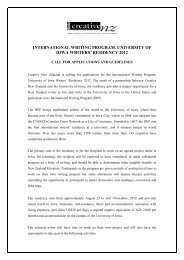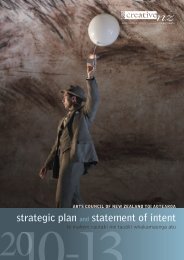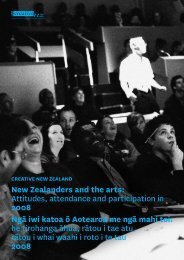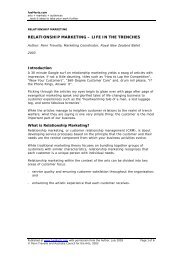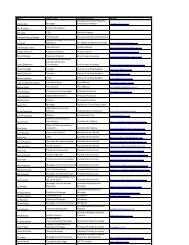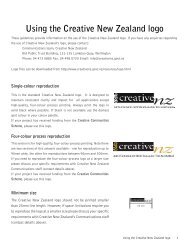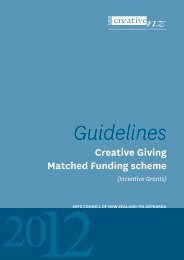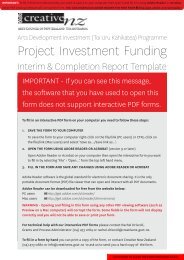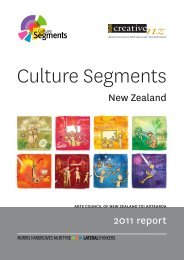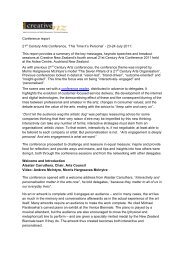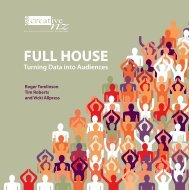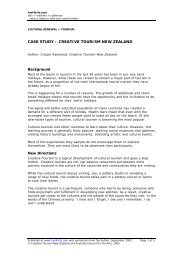Smart Arts - Creative New Zealand
Smart Arts - Creative New Zealand
Smart Arts - Creative New Zealand
- No tags were found...
Create successful ePaper yourself
Turn your PDF publications into a flip-book with our unique Google optimized e-Paper software.
ROUNDFIGURESOffering ticket prices to anexhibition at a few differentlevels is important.Discounts for groups,cheaper weekday visits andmulti-visit tickets are allpopular. Also try and keepthe price to a round figure:$10 looks, sounds and feelsbetter than $12, for example.You can get the extra $2from catalogue or othermerchandising sales. Givevisitors a basic printed guidewith their ticket, if possible,as part of their purchase. Itdoesn’t have to be a minicataloguebut it can beanother marketing tool,containing informationabout any eventssurrounding the exhibitionthat visitors might make areturn visit for.TIMINGITRIGHTThe timing of your showmay also be crucial to youraudience. A teenageaudience may enjoy amidnight performance butit’s unlikely to attract anolder audience, especiallyduring the week. Alsoconsider how people willget home after the show.Are buses still running?Another consideration isthe length of your show.What’s the stamina of youraudience in terms of thevenue’s comfort factor?• look for other avenues of income such as sponsorship or funding (remembering that theserequire a lot of lead-in time)?• reconsider your timing and postpone the event?Deciding what to charge for an exhibition is similar to deciding on the price to attend aperforming arts event: i.e. what’s the income required to offset some of the costs in yourbudget? Also ask yourself what a salary-earning adult or a family of four would pay to seea movie, play or concert, or have a cafe meal?Pre-booking isn’t an issue for exhibitions as people tend to buy their tickets at the venueon the day. For blockbuster exhibitions, airlines and other transport providers are oftenkeen to work out packages that include transport, accommodation and a ticket to theexhibition. But most visitors will be local people, who will decide on the day, or a fewdays in advance, to see the exhibition.Place<strong>Smart</strong> arts | Toi huatau13Your event should be staged at a time, date and place to suit your audience. Take, forinstance, a show aimed at school children. You may choose to perform your show bytouring to individual schools. Or you may decide to use an established theatre and attractschool audiences to your venue if the show is large and not easy to tour.Is your audience likely to come as part of a school group or are parents more likely tobring them? This will help you decide whether to run your season during the school termor the holidays. It will also influence your choice of venue.When you’re choosing a venue consider these issues:• How familiar are your target markets with the venue?• Are there any physical impediments? For example, an event targeted to senior citizenswill need to be in a venue with easy access, including wheelchair access.• What expectations does your venue engender about aspects such as show content, qualityor innovation? Staging a show at the SiLO or BATS Theatres creates differentexpectations to The Court or Downstage Theatres.• What facilities are there for your public? This includes seating, refreshments, toilets,heating, front of house staff. A youthful audience may be happy sitting on the floor of adraughty warehouse but an older audience isn’t likely to be attracted to this venue.• Have you informed your audience about the protocol particular to that venue? Forexample: no smoking/eating/drinking, cell phones turned off, no photography or videos,use of smoking/strobe light/offensive content on stage, admittance of latecomers’ policy,length of interval, reserved seating.• Is the venue easy to find or will people need a map to find it? Are there buses nearby?Where is the closest parking? Where can people get a drink?• Where do people book? Can they pay by eftpos, credit card or cheque?• Is it Occupational Safety and Health Services (OSH) compliant? What are the safetyprocedures of your venue in case of fire/earthquake? Will you be able to deal with anyhealth emergency? Visit www.osh.dol.govt.nz for more information.• Other legal compliances to be aware of include toilets, access for the disabled, and food tobe served with alcohol.• How many people does the venue seat and how does it impact on your budget?• What facilities are there for your production’s requirements? For example: lights, sound,size and height of stage, backstage facilities, what staff it comes with (technical support,box office and ushers).Planning a marketing strategy1



